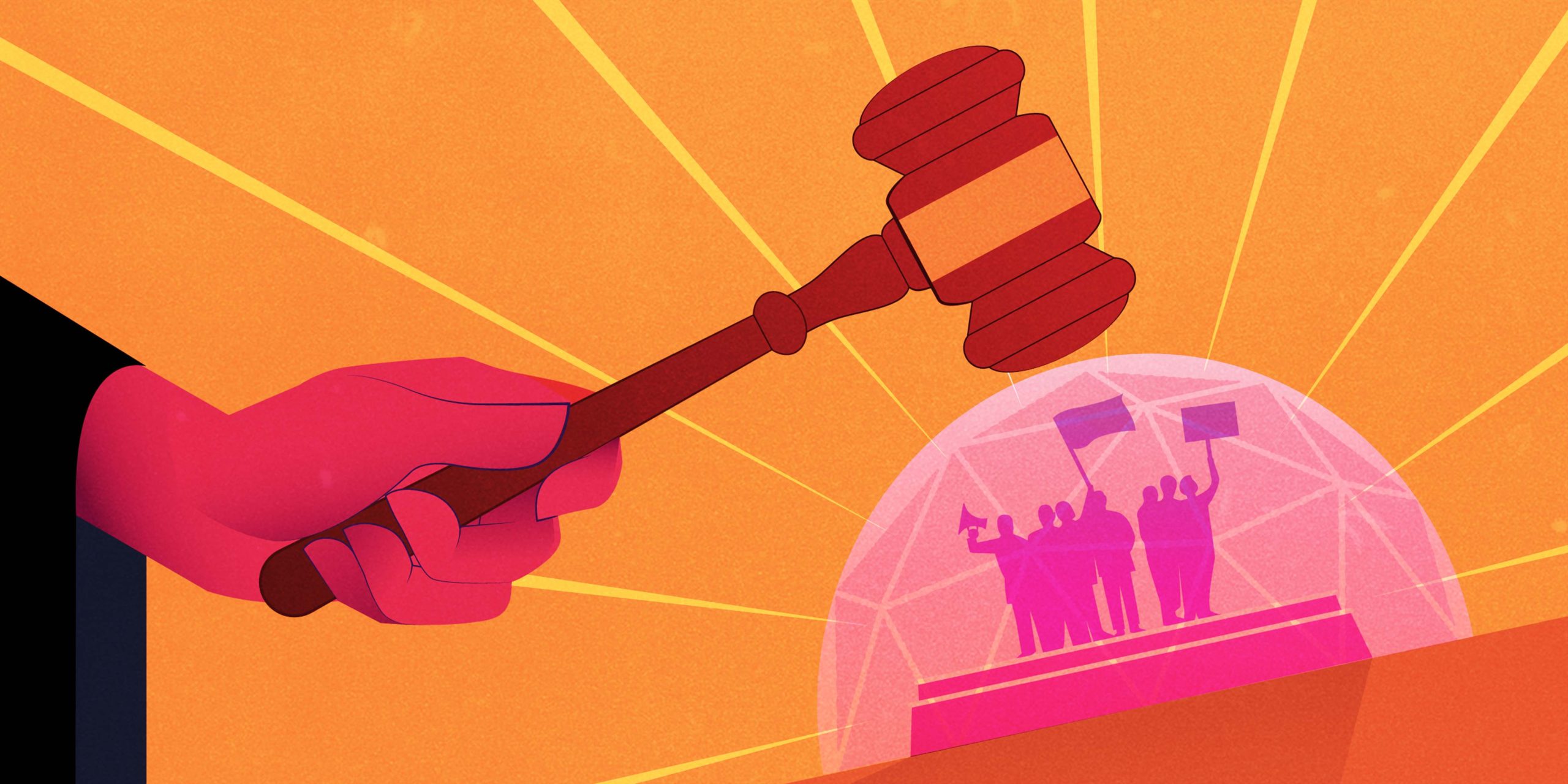For years now, deep-pocketed individuals and corporations have been turning to civil lawsuits to silence their opponents. These Strategic Lawsuits Against Public Participation, or SLAPPs, aren’t designed to win on the merits, but rather to harass journalists, activists, and consumers into silence by suing them over their protected speech. While 34 states have laws to protect against these abuses, there is still no protection at a federal level.
Today, Reps. Jamie Raskin (D-MD) and Kevin Kiley (R-CA) introduced the bipartisan Free Speech Protection Act. This bill is the best chance we’ve seen in many years to secure strong federal protection for journalists, activists, and everyday people who have been subject to harassing meritless lawsuits.
Tell Congress We Don’t want a weaponized court system
The Free Speech Protection Act is a long overdue tool to protect against the use of SLAPP lawsuits as legal weapons that benefit the wealthy and powerful. This bill will help everyday Americans of all political stripes who speak out on local and national issues.
Individuals or companies who are publicly criticized (or even simply discussed) will sometimes use SLAPP suits to intimidate their critics. Plaintiffs who file these suits don’t need to win on the merits, and sometimes they don’t even intend to see the case through. But the stress of the lawsuit and the costly legal defense alone can silence or chill the free speech of defendants.
State anti-SLAPP laws work. But since state laws are often not applicable in federal court, people and companies can still maneuver to manipulate the court system, filing cases in federal court or in states with weak or nonexistent anti-SLAPP laws.
SLAPPs All Around
SLAPP lawsuits in federal court are increasingly being used to target activists and online critics. Here are a few recent examples:
Coal Ash Company Sued Environmental Activists
In 2016, activists in Uniontown, Alabama—a poor, predominantly Black town with a median per capita income of around $8,000—were sued for $30 million by a Georgia-based company that put hazardous coal ash into Uniontown’s residential landfill. The activists were sued over statements on their website and Facebook page, which said things like the landfill “affected our everyday life,” and, “You can’t walk outside, and you cannot breathe.” The plaintiff settled the case after the ACLU stepped in to defend the activist group.
Shiva Ayyadurai Sued A Tech Blog That Reported On Him
In 2016, technology blog Techdirt published articles disputing Shiva Ayyadurai’s claim to have “invented email.” Techdirt founder Mike Masnick was hit with a $15 million libel lawsuit in federal court. Masnick, an EFF Award winner, fought back in court and his reporting remains online, but the legal fees had a big effect on his business. With a strong federal anti-SLAPP law, more writers and publishers will be able to fight back against bullying lawsuits without resorting to crowd-funding.
Logging Company Sued Greenpeace
In 2016, environmental non-profit Greenpeace was sued along with several individual activists by Resolute Forest Products. Resolute sued over blog post statements such as Greenpeace’s allegation that Resolute’s logging was “bad news for the climate.” (After four years of litigation, Resolute was ordered to pay nearly $1 million in fees to Greenpeace—because a judge found that California’s strong anti-SLAPP law should apply.)
Congressman Sued His Twitter Critics And Media Outlets
In 2019, anonymous Twitter accounts were sued by Rep. Devin Nunes, then a congressman representing parts of Central California. Nunes used lawsuits to attempt to unmask and punish two Twitter users who used the handles @DevinNunesMom and @DevinCow to criticize his actions as a politician. Nunes filed these actions in a state court in Henrico County, Virginia. The location had little connection to the case, but Virginia’s weak anti-SLAPP law has enticed many plaintiffs there.
Over the next few years, Nunes went on to sue many other journalists who published critical articles about him, using state and federal courts to sue CNN, The Washington Post, his hometown paper The Fresno Bee, MSNBC, a group of his own constituents, and others. Nearly all of these lawsuits were dropped or dismissed by courts. If a federal anti-SLAPP law were in place, more defendants would have a chance of dismissing such lawsuits early and recouping their legal fees.
Fast Relief From SLAPPs
The Free Speech Protection Act gives defendants of SLAPP suits a powerful tool to defend themselves.
The bill would allow a defendant sued for speaking out on a matter of public concern to file a special motion to dismiss, which the court must generally decide on within 90 days. If the court grants the speaker-defendant’s motion, the claims are dismissed. In many situations, defendants who prevail on an anti-SLAPP motion will be entitled to have the plaintiff reimburse them for their legal fees.
Tell Congress to pass the free speech protection act
EFF has been defending the rights of online speakers for more than 30 years. A strong federal anti-SLAPP law will bring us closer to the vision of an internet that allows anyone to speak out and organize for change, especially when they speak against those with more power and resources. Anti-SLAPP laws enhance the rights of all. We urge Congress to pass The Free Speech Protection Act.


